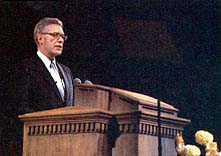by Terrie Lynn Bittner | Oct 15, 2012 | Mormon Beliefs: Christian Values
Mormon children are often taught their faith through music, which has been shown to help teachings enter a child’s heart in a way spoken words cannot. The songs they sing on Sundays at church and at home teach basic gospel principles that can help the children learn to live their faith. These songs often come to their minds when they have choices to make about how to live their lives.
“I Will Follow God’s Plan for Me” teaches children that God has a plan for their lives and that choosing to follow it will bring them happiness in this life and in the next life. The song was originally called “I Can Follow God’s Plan for Me.” In the October General Conference, a world-wide meeting for Mormons, the international president of the children’s auxiliary, Michaelene P. Grassli, explained that “can” was changed to “will” to reflect the commitment they wanted children to make to living as God wants them to live. Knowing you can do something is not the same as actually doing it.
In this lovely hymn, children learn that their very lives were a choice, a gift from God who loves us and who cherishes our right to make choices for ourselves—not consequence-free choices, but choices. Mormons teach that after God created our spirits, He allowed us to live with Him for a while in spirit form. We learned about God and His plan for us and built a personal relationship with Him by being in His presence and learning from Him. He was able to observe our choices and our growth. We decided how important God really was to us and how much faith we had in His plan. (more…)

by Terrie Lynn Bittner | Oct 2, 2012 | Mormon Beliefs: Christian Values
Elder Bruce R. McConkie, a Mormon Apostle, wrote the poem “I Believe in Christ” which he recited in 1972 as part of his General Conference address. The poem is the basis for the beautiful Mormon hymn which bears the same title. Elder McConkie requested that noted organist, John Longhurst compose an original hymn using his poem. In his final public testimony he testified of the Savior of whom the poem and subsequent hymn were written, and spoke of one day soon, seeing Him face to face. He had cancer and had been given just two months to live, but managed to live fourteen months more, although very ill during it, because he knew there were things God still wanted him to do. Despite an enormous amount of pain, he continued to do the work of the Lord. After surgery, he said, “I am quite overwhelmed by deep feelings of thanksgiving and rejoicing for the goodness of the Lord to me. He has permitted me to suffer pain, feel anxiety, and taste his healing power.” (Ensign, May 1984, p. 32.)
 He told his wife he was going to give a talk about Jesus Christ at the next General Conference. General Conference is held twice a year and gives Mormons a chance to hear from their church leaders. His wife was concerned because he was so ill. His doctors were afraid that if he tried to give the talk, he would collapse right there on television. However, he was insistent and gave the talk without incidence. He died just fourteen days later, having delivered a powerful testimony of the Lord Jesus Christ: (more…)
He told his wife he was going to give a talk about Jesus Christ at the next General Conference. General Conference is held twice a year and gives Mormons a chance to hear from their church leaders. His wife was concerned because he was so ill. His doctors were afraid that if he tried to give the talk, he would collapse right there on television. However, he was insistent and gave the talk without incidence. He died just fourteen days later, having delivered a powerful testimony of the Lord Jesus Christ: (more…)

by Terrie Lynn Bittner | Sep 26, 2012 | Mormon Reflections
I didn’t grow up in any particular faith, but I was taught about God and Jesus Christ. Over time, I developed my own ideas of who God was. Because He is called the Father, I saw in God the qualities of my own father. I looked to a God who was intelligent, who encouraged me to be everything I could be, who was there for me, who wanted me to have the best of his life and more, and a father who was, therefore, loving.
 As I got older and began visiting churches, however, it seemed hard to find this God. The God presented to me just didn’t seem very loving or to have anyone’s best interest at heart. Why would a God who loves His children play favorites, letting some hear the gospel and be saved, while others have no opportunity to hear it and are doomed? Why would He condemn small children who died because their parents failed to baptize them? Why did He put people on Earth in such differing circumstances?
As I got older and began visiting churches, however, it seemed hard to find this God. The God presented to me just didn’t seem very loving or to have anyone’s best interest at heart. Why would a God who loves His children play favorites, letting some hear the gospel and be saved, while others have no opportunity to hear it and are doomed? Why would He condemn small children who died because their parents failed to baptize them? Why did He put people on Earth in such differing circumstances?
Mainstream Christianity didn’t seem to have an answer to those questions. The Mormons, when I met them, did. I listened. (more…)
by Terrie Lynn Bittner | Sep 20, 2012 | Mormons in the News
Robert Stephen Beecroft has been nominated by President Obama to be the ambassador to Iraq. Beecroft, a Mormon, served as the ambassador to Jordon from 2008 to 2011. Robert S. Beecroft served a two-year mission in Venezuela for The Church of Jesus Christ of Latter-day Saints, whose members are often called Mormons, when he was a young adult. He graduated with a B.A. from Brigham Young University and a J.D. from the University of California, Berkley. Brigham Young University is owned and operated by the Mormons. He was a lawyer prior to joining the Foreign Service.
He has served in the Department of State’s Bureau of Near Eastern Affairs and Executive Secretariat and at the U.S. embassies in Riyadh and Damascus. He has served as Executive Assistant to Secretaries of State Condoleezza Rice and Colin Powell and as Special Assistant to Deputy Secretary of State Richard Armitage. Beecroft received the Department of State’s Meritorious, Superior, and Distinguished Honor Awards.
Beecroft has been running the embassy since 2011 and therefore is already in place. He must await confirmation hearings, however. President Obama has previously named two other former Mormon missionaries to ambassadorships—Matthew Tueller, also a BYU graduate, was ambassador to Kuwat and Jon Huntsman was ambassador to China and learned to speak Chinese while serving his Mormon mission. (more…)

by Terrie Lynn Bittner | Aug 21, 2012 | About Mormons, Mormon Beliefs: Christian Values
Religion, while making use of the intellect, is not primarily an intellectual pursuit. While it is interesting to study the science or history behind a given spiritual topic, this isn’t, ultimately, what gives us a testimony of its truthfulness. A person can know all the facts there are to know about prayer and still not have a testimony that prayer works.
 In order to gain a testimony of a specific doctrine, and ultimately of the church that teaches it, we have to have spiritual experiences with that doctrine. A person who is considering becoming a Mormon is taught to first make certain God wants him to join the church. This involves the process of gaining a testimony. The missionaries who teach the investigator (a person learning about Mormonism) will present facts about the church and will teach the member how to learn more. They will teach him how to gain a testimony—but they can’t give him a testimony. That is an entirely personal responsibility.
In order to gain a testimony of a specific doctrine, and ultimately of the church that teaches it, we have to have spiritual experiences with that doctrine. A person who is considering becoming a Mormon is taught to first make certain God wants him to join the church. This involves the process of gaining a testimony. The missionaries who teach the investigator (a person learning about Mormonism) will present facts about the church and will teach the member how to learn more. They will teach him how to gain a testimony—but they can’t give him a testimony. That is an entirely personal responsibility.
Spiritual experiences help people gain a testimony and they also serve to strengthen a testimony previously gained. They have another purpose as well, one that ensures a successful mortal life. (more…)


 He told his wife he was going to give a talk about Jesus Christ at the next General Conference. General Conference is held twice a year and gives Mormons a chance to hear from their church leaders. His wife was concerned because he was so ill. His doctors were afraid that if he tried to give the talk, he would collapse right there on television. However, he was insistent and gave the talk without incidence. He died just fourteen days later, having delivered a powerful testimony of the Lord Jesus Christ:
He told his wife he was going to give a talk about Jesus Christ at the next General Conference. General Conference is held twice a year and gives Mormons a chance to hear from their church leaders. His wife was concerned because he was so ill. His doctors were afraid that if he tried to give the talk, he would collapse right there on television. However, he was insistent and gave the talk without incidence. He died just fourteen days later, having delivered a powerful testimony of the Lord Jesus Christ: 
 As I got older and began visiting churches, however, it seemed hard to find this God. The God presented to me just didn’t seem very loving or to have anyone’s best interest at heart. Why would a God who loves His children play favorites, letting some hear the gospel and be saved, while others have no opportunity to hear it and are doomed? Why would He condemn small children who died because their parents failed to baptize them? Why did He put people on Earth in such differing circumstances?
As I got older and began visiting churches, however, it seemed hard to find this God. The God presented to me just didn’t seem very loving or to have anyone’s best interest at heart. Why would a God who loves His children play favorites, letting some hear the gospel and be saved, while others have no opportunity to hear it and are doomed? Why would He condemn small children who died because their parents failed to baptize them? Why did He put people on Earth in such differing circumstances?
 In order to gain a testimony of a specific doctrine, and ultimately of the church that teaches it, we have to have spiritual experiences with that doctrine. A person who is considering becoming a Mormon is taught to first make certain God wants him to join the church. This involves the process of gaining a testimony. The missionaries who teach the investigator (a person learning about Mormonism) will present facts about the church and will teach the member how to learn more. They will teach him how to gain a testimony—but they can’t give him a testimony. That is an entirely personal responsibility.
In order to gain a testimony of a specific doctrine, and ultimately of the church that teaches it, we have to have spiritual experiences with that doctrine. A person who is considering becoming a Mormon is taught to first make certain God wants him to join the church. This involves the process of gaining a testimony. The missionaries who teach the investigator (a person learning about Mormonism) will present facts about the church and will teach the member how to learn more. They will teach him how to gain a testimony—but they can’t give him a testimony. That is an entirely personal responsibility.